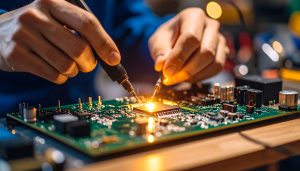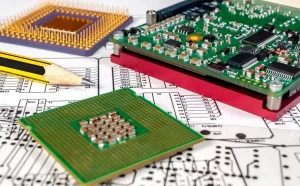U.S.-based PCB suppliers support test equipment OEMs with ISO-certified quality, close engineering collaboration, fast prototyping, and secure domestic production. These elements are critical for delivering accurate, reliable test electronics—without the variable risks that often accompany offshore manufacturing.
The Demanding World of Test and Measurement Electronics
Test and measurement equipment is used in some of the most demanding industries, including industrial automation, laboratory research, and complex systems diagnostics. Each device must consistently process and analyze complex electrical signals with extremely high precision under variable environmental conditions.
At the core of these instruments lies a highly specialized PCB that must deliver uncompromised signal integrity, resist interference, and reliably support both analog and digital functions. Additionally, these PCBs often require stable power delivery within compact, tightly integrated form factors.
Because these products frequently fall into mid-volume production ranges—spanning from thousands to tens of thousands of units—OEMs must partner with manufacturers who can maintain consistency at scale. For these reasons, domestic PCB manufacturing has become more than a preference—it’s a strategic necessity.
Why Global PCB Sourcing Creates Unacceptable Risks
Offshore PCB production can introduce risks that are difficult to control. Even minor variances in board quality or production standards can compromise performance. Test and measurement companies that rely on offshore suppliers frequently encounter:
- Signal degradation from inconsistent trace width or material properties
- Solder joint variation affecting board reliability
- Limited real-time oversight and slower issue resolution due to time zone differences
- Incomplete quality control documentation
According to the 2024 IPC Global Electronics Supply Chain Survey, 82% of manufacturers reported sourcing challenges that impacted both delivery timelines and product performance. For precision equipment, such failures directly impact customer trust, device certification, and long-term reliability.
U.S.-based PCB partners help mitigate these risks through better visibility, faster feedback loops, and tighter quality control—all essential for delivering boards that meet high-performance specifications every time.
ISO 9001 and IPC Standards Build Quality Confidence
Test equipment makers operate in environments where failure is not an option. This level of performance requires rigorous adherence to quality benchmarks. U.S.-based PCB suppliers like Thomas Instrumentation follow standardized frameworks to ensure every product is produced to spec, including:
- ISO 9001 for quality management
- IPC-A-610 for electronics assembly acceptability
- Full traceability of components from procurement to production
- Inspection documentation for each manufacturing batch
The National Institute of Standards and Technology (NIST) reports that domestic PCB defect rates are 40–55% lower than offshore alternatives. At Thomas Instrumentation, this is backed by an internal defect rate of less than 1%, and a dedicated practice of root cause analysis for any issue. This proactive approach ensures that each board not only meets specifications but also upholds the reliability standard critical to test equipment users.
Engineering Collaboration Drives Better Design Outcomes
Developing reliable PCBs for test equipment requires early collaboration between product engineers and manufacturing experts. Delaying manufacturer involvement until after design finalization can lead to costly revisions.
Design-for-manufacturing (DFM) input at the schematic and layout stages helps prevent late-stage changes and speeds up prototyping. Domestic manufacturing teams, like those at Thomas Instrumentation, offer:
- Immediate feedback during design reviews
- Prototyping options that fit rapid development cycles
- Smooth transitions from prototype to scaled production
Close collaboration accelerates development timelines, increases the manufacturability of complex boards, and ensures the final product meets performance expectations from the start.
Domestic Production Supports Regulatory Compliance and Documentation
Test and measurement electronics are often subject to rigorous regulatory controls, requiring traceable, documented manufacturing practices. Working with domestic PCB suppliers streamlines this process by:
- Maintaining full transparency for raw material sourcing
- Supporting compliance with RoHS, REACH, and conflict mineral standards
- Providing ISO-compliant records for audits and customer reviews
These documentation standards protect OEMs from regulatory setbacks and reassure customers who demand high accountability for the products they use in critical environments.
Protecting Intellectual Property and Competitive Advantage
Many test devices contain proprietary signal processing methods, calibration procedures, and embedded software—all critical intellectual property that differentiates one OEM from another. Manufacturing overseas introduces the risk of:
- IP theft or design duplication
- Firmware tampering
- Loss of control over production
By manufacturing domestically, OEMs ensure that sensitive technology stays within U.S. borders. This control is particularly important for maintaining competitive positioning and delivering protected, secure technology to end users.
Mid-Volume Domestic Production Offers Predictable Cost Control
Although offshore suppliers may appear cheaper on a per-unit basis, hidden costs often erode those savings. Domestic production can reduce or eliminate several unplanned expenses:
- Freight and customs duties
- Excess inventory costs due to extended lead times
- Communication breakdowns that delay changes or launches
- Expensive rework caused by offshore quality escapes
The Reshoring Initiative found that 46% of U.S. manufacturers saw net cost savings after returning production to domestic partners. For test and measurement companies navigating mid-volume production with tight accuracy tolerances, this balance of predictability and reliability can deliver both operational and financial benefits.
Federal Policy Supports U.S. Electronics Reshoring
National investment in reshoring electronics production is accelerating through initiatives like the CHIPS and Science Act. Coupled with increasing cybersecurity threats, these federal programs emphasize the importance of securing supply chains and strengthening domestic electronics capabilities.
Domestic PCB production suports:
- High-skill job creation
- Energy independence
- Technology security against foreign threats
For OEMs working with complex or sensitive instrumentation, the stability and accountability of U.S.-based PCB suppliers offer a long-term advantage that goes beyond price and lead times.
Thomas Instrumentation’s Expertise in Test Equipment PCB Manufacturing
Thomas Instrumentation delivers precision-focused PCB manufacturing for test and measurement OEMs. With engineering consultation and in-house prototyping, the team provides:
- High-density multilayer PCB fabrication
- Precision surface mount and through-hole assembly
- Embedded firmware programming and verification
- Full lifecycle engineering support—from concept to production
With less than a 1% defect rate and a commitment to identifying and eliminating failure causes, Thomas Instrumentation ensures the performance and reliability that test equipment manufacturers depend on. OEMs can move confidently from early design to full production with the assurance of quality, responsiveness, and U.S.-based accountability.
Ready to Simplify Your Test Equipment PCB Production?
Please fill out the form on our Contact Page to streamline your next test equipment PCB project.



